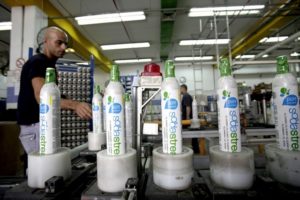Soros fund drops shares in Israel’s SodaStream

Mahmoud Kassem
August 2, 2014
Soros Fund Management, the family office of the billionaire investor George Soros, has sold its stake in SodaStream, the soda making appliance producer that profits from the Israeli occupation of Palestinian territories and was made popular by actress Scarlett Johansson’s endorsement.
The decision comes as a number of big international investors, including the fund linked to the Microsoft founder Bill Gates, join in a burgeoning financial boycott of Israel amid a push by the boycott, divestment and sanctions (BDS) movement and other groups seeking more rights for Palestinians.
SodaStream, headquartered in the Israeli city of Lod, has its main factory in the West Bank settlement of Ma’ale Adumim.
“Soros Fund Management does not own shares of SodaStream,” Michael Vachon, a spokesman for the fund, told The National, declining to comment further on when and why it sold the shares.
In a May filing with the US markets regulator, the fund said it had bought 550,000 shares of SodaStream during the first quarter. Bloomberg reported that the fund acquired the shares for $24.3 million, with the new holding making up 0.3 per cent of the fund’s $9.3 billion stock portfolio.
“After pressure from Soros partners in the region and the world, they dropped SodaStream and promised, in private letters so far, to issue guidelines similar to those adopted by the EU to prevent any investment into companies that sustain the Israeli occupation and settlements in particular,” said Omar Barghouti, the Palestinian activist and co-founder of the BDS movement.
Several western investors said earlier this year that they had sold off holdings in companies that make money from business in occupied territories. Norway’s $810bn sovereign wealth fund, the world’s largest, a Dutch pension fund, and the Presbyterian Church in the US are among those that have excluded some Israeli and US companies from their portfolios this year. The companies operate in the occupied territories, where settlements built by Israel have been deemed illegal by the UN Security Council and the International Court of Justice among others.
Financial and economic boycotts have been tried before, most notably when Saudi Arabia and other Opec members stopped selling oil to the West in 1973 in reaction to the support given by the US and other nations to Israel during its war with Egypt.
But with the 1979 peace agreement that heralded a political and economic rapprochement with Egypt and eventually other Arab nations, the momentum fizzled away.
It is only in the past decade that there has been a revival of the boycott movement looking to end the Israeli occupation of land captured during the 1967 Arab-Israeli war, allow Palestinians refugees to return home and end discrimination against Palestinians.
Analysts say that as the two-state solution – the framework in which peace negotiations have been undertaken for the past two decades – flounders, a growing anti-apartheid movement is filling its shoes.
This year has been a strong one for BDS. The Gates Foundation Asset Trust, which manages investments for the $40bn Bill and Melinda Gates Foundation, said in June that it sold its stake in the UK security services firm G4S, one of the companies targetted by BDS. The movement has also been in focus during the Israeli assault on Gaza and the widespread anti-war protests against the killing of hundreds there.
Earlier this year, Israel’s finance minister acknowledged the impact that a European-wide boycott could have on the country, depriving the economy of $5.7bn and putting almost 10,000 people out of work immediately. The prime minister Benjamin Netanyahu has also acknowledged the threat posed by BDS. In a March speech in the US, Mr Netanyahu launched an attack on the movement, branding them as racists.
http://www.thenational.ae/business/industry-insights/economics/soros-fund-drops-shares-in-israels-sodastream#ixzz39MkzmybE